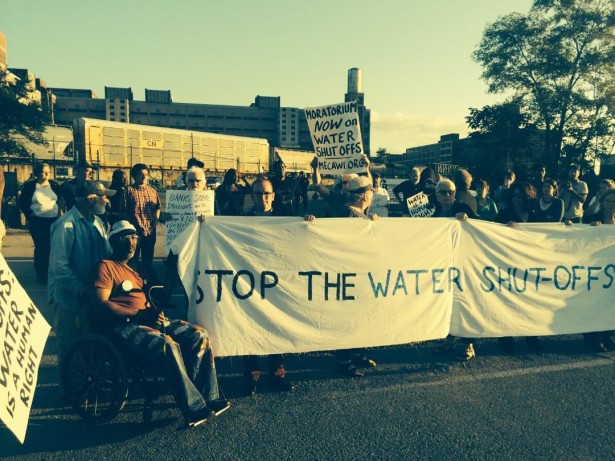
On July 28, Detroit Emergency Manager Kevyn Orr, who has operated the Detroit Water and Sewage Department, or DWSD, and been responsible for turning off water for more than 15,000 Detroit residents, issued an order transferring control of the department back to the city of Detroit and recently elected Mayor Mike Duggan. Many attribute the change to the hard work of Detroit-based community activists protesting, marching and advocating on behalf of Detroit residents.
“This decision comes after months of sustained pressure from a broad cross-section of Detroiters and their international allies: protest marches, direct action blockades, hundreds of thousands of petition signers, and a recently-filed injunction in U.S. Bankruptcy Court calling for an immediate end to the shutoff program,” said the Detroit Water Brigade, a group of activists organizing to bring water to low-income residents of Detroit, in response to the news. “We also look forward to a day when all of Detroit’s public services are returned from privatization and mismanagement to full popular control by accountable and democratically elected officials.”
Over the past four months the DWSD has been shutting off the water for residents with outstanding water bills, something that is common in a city where 40 percent live below the poverty line. Over the past 10 years, the cost of water in Detroit has increased by 120 percent, and, as the manufacturing jobs that gave the Motor City its nickname were off-shored, average household incomes did not keep up. As the city sank into bankruptcy, an emergency manager was placed in charge of the city, and the privatization of water began. Since March, 15,000 Detroit residents have had their water turned off and another 92,000 have been threatened with shut-offs. Despite owing an outstanding total of $9.5 million to the DWSD, not a single business has had its water threatened. Only Detroit’s low-income residents have felt the effects.
In spite of the lack of government support or media attention towards Detroit, several initiatives have sprung up to fill the void and assist Detroit residents in regaining access to water. Perhaps most well-known is the Detroit Water Brigade, which not only canvases neighborhoods and brings water to families in need, but also advocates for affordable payment plans. Another group, Detroit Water Project, is an online crowd-funding initiative designed to match donors directly with families to immediately pay their water bill.
The morning of August 2, activists from the Detroit Water Brigade reported that the mayor’s office would not let them enter the payment center to advocate with residents for affordable payment plans and threatened them with arrest. It is unclear whether Mayor Duggan will genuinely advocate for residents, place water back in the commons and create payment plans that work for them, or continue privatizing Detroit’s water supply. Until there is a just resolution that meets the needs of those facing this crisis, activists know that their work is not over.
